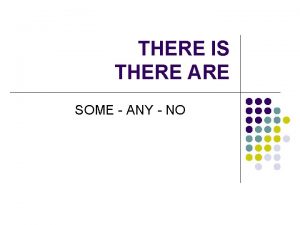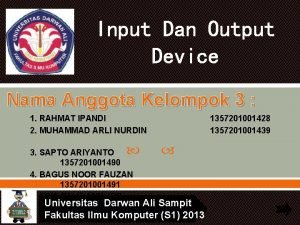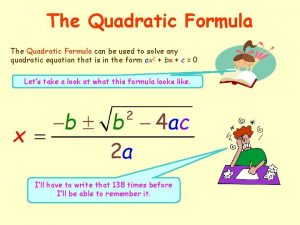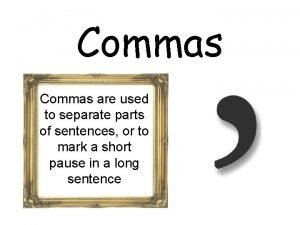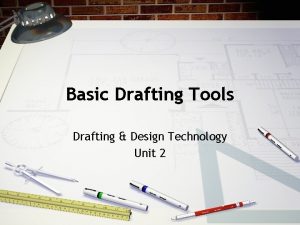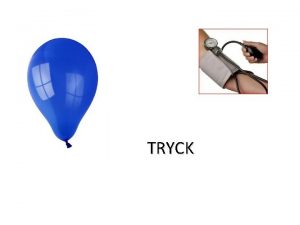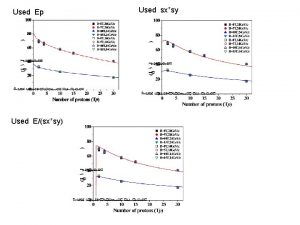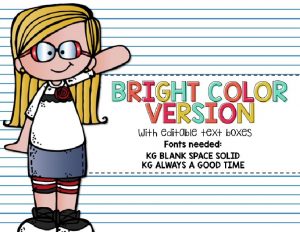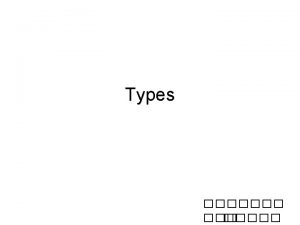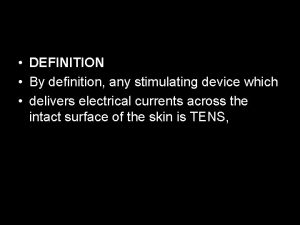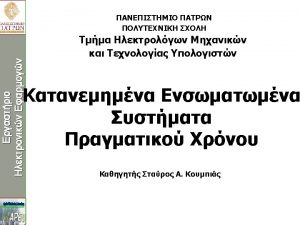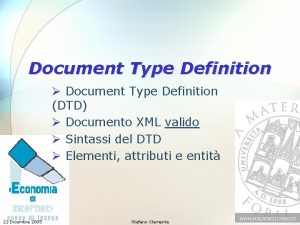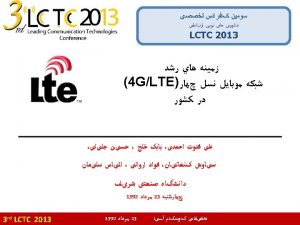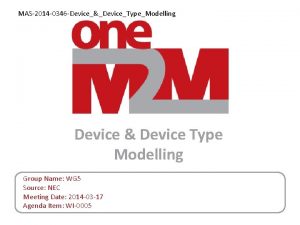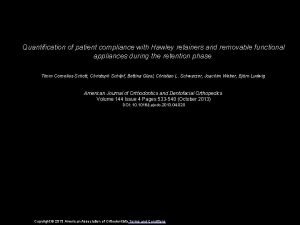RETAINERS DEFINITION Any type of device used for





























- Slides: 29

RETAINERS DEFINITION: Any type of device used for stabilization or retention of prosthesis -- GPT

n Retainer n That for an FPD… component of an FPD which takes support from the abutment tooth and provides retention to the prosthesis


SELECTION OF RETAINERS n 1) 2) 3) 4) 5) 6) Retainer selection for abutment is critical and is dictated by the followings: Age DMF rate Edentulous space-Partial veneer crown contraindicated in long span FPD Periodontal support Arch position of the tooth Skeletal relationship

7) 8) 9) Inter occlusal & intraocclusal condition such as crown length Oral hygiene of the patient Vitality of the abutment teeth--endodontically treated teeth may have to be restored with core & post before designing the retainer

10) Condition of the abutment teeth 11) Cost 12) Preservation of the tooth structure----Buccal surface should be conserved. Partial veneer crown is more conservative than full crown. All ceramic crowns are least conservative

Types of retainers Classified as: Based on tooth coverage n I. n n n Full veneer crown Partial veneer crown Conservative (minimal prep. ) retainers

Based on material used II. n n All metal retainers Metal ceramic retainers All acrylic retainers

Full veneer crowns n n Covers all 5 surfaces of abutment Most retentive of the veneer preparations Compared to partial veneer designs, full veneer crown exhibits superior resistance nd retention Used on those teeth whose restoration demands max. retention.

n n Variations—Metal ceramic crowns and all ceramic crowns used in situations that requires a good cosmetic results The full veneer crown should be used when less extensive and less destructive design have been considered and found lacking in retention , resistance , coverage or esthetics to properly restore the tooth

Partial veneer crown n n Preferred than full veneer crown because they requires less tooth reduction Crown does not cover the entire abutment Facial surface is left intact for superior esthetics Used when minimal retention is sufficient and when abutment tooth is healthy

Contra indications n In long span FPDs n Endodontically treated tooth n Dentition with active caries or periodontal disease n Poorly aligned abutment tooth

Advantages n Conservation of tooth structure n Reduced pulpal and periodontal insult during tooth prep n Improved access for finishing by dentist & oral hygiene by patient

n Less of margin approximate soft tissues subgingivally and hence less gingival involvement than complete coverage n Remaining intact facial or buccal tooth surface permits electric vitality test

Disadvantages Less retention & resistance than complete crowns n Some metal displayed in completed restoration—unaesthetic n Tooth prep is difficult because only limited adjustments can be made in the path of placement n

Resin bonded retainers (Maryland bridges) n Require minimal tooth preparation n Acid etched n Esthetically appealing n Economical , conservative , functional & do not irritate soft or hard tissues

Indication n As retainers of FPD for abutment with sufficient enamel to etch n Splinting of periodontally compromised teeth n Stabilizing dentition after orthodontic treatment

Contraindication n In patients with sensitivity to base metal alloys n When facial esthetic of abutment require improvement n Inadequate enamel surface to bond eg; caries, existing restoration n Incisor with extremely thin faciolingual dimension

Advantages Non invasive to dentin with lingual and proximal tooth preparation including occlusal rest n Conservative with undeniable patient appearance n Tissue tolerant because of Supragingival margin, without pulpal irritation n Reduced cost and less chair side time n

Disadvantage n Demanding technique and tooth prep. n Plaque accumulation n Bulky contour n Restricted to single pontic placement n Graying out of teeth that are thin labiolingually

Based on material used n All metal retainers n Metal ceramic retainers n All ceramic retainers

All metal retainers n Partial or full veneer crown n Require minimal tooth reduction n Strong even in thin sections

Metal ceramic retainers Indicated on teeth that require complete coverage & esthetic demand n Can accommodate cast or soldered connectors n Can afford high force—metal n Require more teeth reduction n

Indication Extensive tooth destruction as a result of caries or trauma n Existing previous restoration that precludes the use of a more conservative restoration n Need for superior retention and strength n Endodontically treated tooth n

Contraindication n. Whenever a more conservative retainer is feasible

All ceramic n Primary purpose ---to achieve best possible esthetic results n Risk of reduced restoration longevity—potential for fracture , inferior marginal adaptation than PFM retainer

Telescopic retainers n n Used when path of insertion of FPD does not coincide with long axis of abutment Design involves fabricatin of two copings one over the other Internal or primary coping function to modify the morphology of tooth –path pf insrtn changed Secondary coping designed to fit over primary

REFERENCES 1. 2. 3. 4. Fundamentals of Fixed Prosthodontics Herber T. Shillingburg Contemporary Fixed Prosthodontics Rosenstiel, Land, Fujimoto Tylmans Theory and Practice of Fixed Prosthodontics Textbook of Prosthodontics-Deepak Nallaswamy

Thanking you…. .
 Hardware output komputer
Hardware output komputer There aren't any oranges
There aren't any oranges Any to any connectivity
Any to any connectivity Any question atau any questions
Any question atau any questions Any device anywhere
Any device anywhere Access anywhere anytime
Access anywhere anytime A tagout device is preferable to using a lockout device.
A tagout device is preferable to using a lockout device. Kelompok output
Kelompok output The quadratic formula can be used to
The quadratic formula can be used to What is used to separate parts of any series
What is used to separate parts of any series Basic drafting tools
Basic drafting tools Kontinuitetshantering
Kontinuitetshantering Typiska novell drag
Typiska novell drag Tack för att ni lyssnade bild
Tack för att ni lyssnade bild Returpilarna
Returpilarna Varför kallas perioden 1918-1939 för mellankrigstiden?
Varför kallas perioden 1918-1939 för mellankrigstiden? En lathund för arbete med kontinuitetshantering
En lathund för arbete med kontinuitetshantering Underlag för särskild löneskatt på pensionskostnader
Underlag för särskild löneskatt på pensionskostnader Personlig tidbok fylla i
Personlig tidbok fylla i A gastrica
A gastrica Förklara densitet för barn
Förklara densitet för barn Datorkunskap för nybörjare
Datorkunskap för nybörjare Tack för att ni lyssnade bild
Tack för att ni lyssnade bild Debattartikel struktur
Debattartikel struktur Magnetsjukhus
Magnetsjukhus Nyckelkompetenser för livslångt lärande
Nyckelkompetenser för livslångt lärande Påbyggnader för flakfordon
Påbyggnader för flakfordon Tryck formel
Tryck formel Svenskt ramverk för digital samverkan
Svenskt ramverk för digital samverkan Jag har nigit för nymånens skära text
Jag har nigit för nymånens skära text

